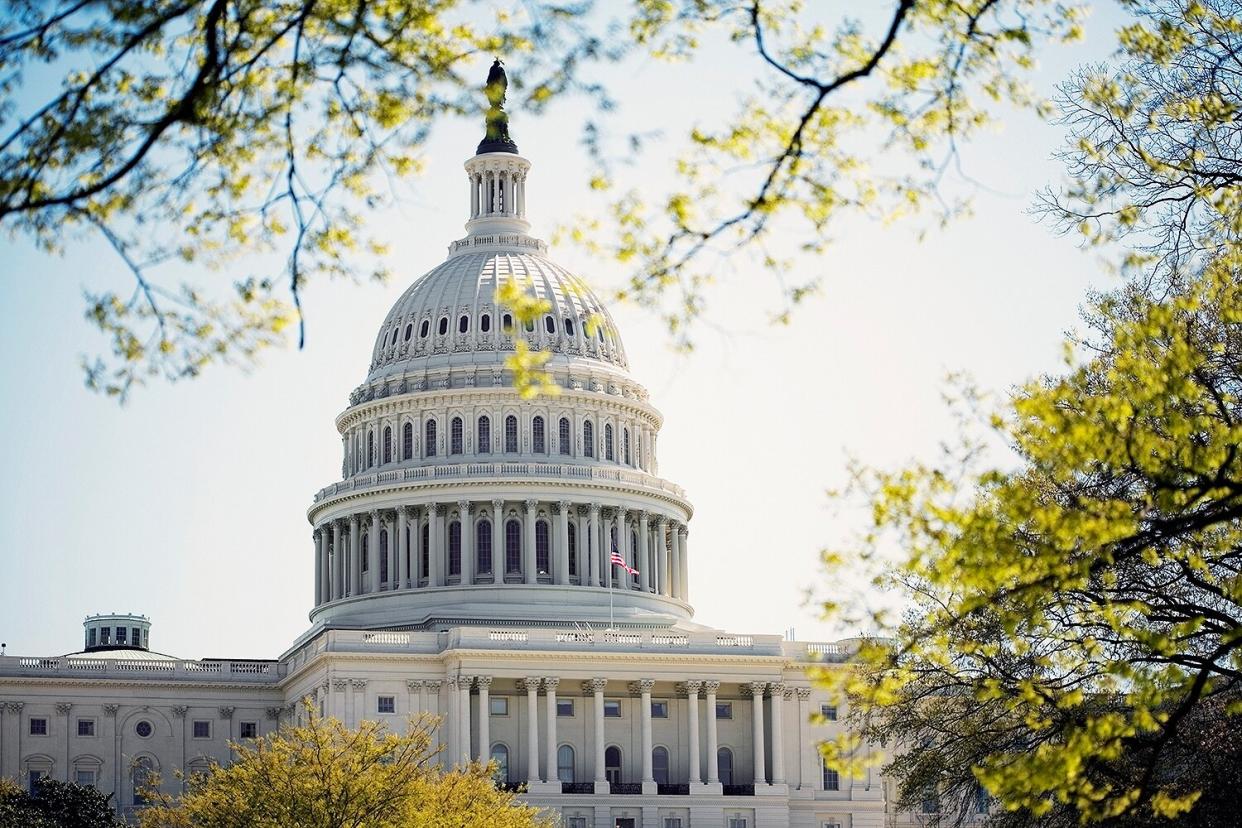House Set to Again Vote on Making Washington, D.C., a State — Though Full Passage Is Unlikely

Getty U.S. Capitol building
The House of Representatives is expected to soon pass a measure that would make Washington, D.C., the country's 51st state after the bill was approved by the House Oversight and Reform Committee.
But the legislation — known as the Washington, D.C. Admission Act — faces a far more uncertain fate in the Senate, where it would need 10 Republicans to overcome a filibuster at the same time that the 50 Democrats are not united in full support.
Still, supporters say, the proposal's success thus far signals growing support for D.C. statehood.
Last year, the House passed a D.C. statehood bill, marking the first time in history either chamber had passed such a measure. (It ultimately died in the Senate.) The bill was re-introduced this year.
On Wednesday, Delaware's Tom Carper, who leads the Senate Democrats who introduced the bill, said it has the support of 45 senators — the most co-sponsors ever — despite widespread Republican opposition.
"Our nation's capital is home to more than 700,000 Americans who, despite our nation's founding mantra — 'no taxation without representation' — pay their share of taxes without full voting representation in either chamber of Congress," Carper said in a statement. "In fact, despite paying more in federal taxes per capita than citizens of any of the 50 states, D.C. residents have no say in how those taxes are actually spent."
His statement continued: "It is therefore incumbent upon all of us who enjoy the right and the privilege of full voting rights and representation to take up the cause of our fellow citizens in the District of Columbia. We must use our voices to call out this historic injustice and right this wrong. I am hopeful that we can finally come together to do just that this Congress."
Civil rights activists have long argued that statehood is integral to the 700,000 people who live in the nation's capital, as they don't currently have any Congressional voting representation.
D.C.'s delegates in the House can propose legislation but cannot vote on it themselves, though they can vote on procedural matters and in congressional committees. D.C. has no representation in the Senate.
According to The New York Times, D.C. residents were able to vote for local government throughout most of the 1800s and, in 1867, the District became the first place in which the right to vote was extended to African-American men. Conservative pushback soon stripped D.C. residents of the right to vote in even local elections, though that was restored during the civil rights movement.
The push for statehood began picking up steam in the 1980s, with D.C. voters ratifying a Constitution for the State of New Columbia in November 1982.
The movement plateaued until 2016, when Mayor Muriel Bowser called for a citywide vote on a new statehood referendum.
They say DC is too small, or our economy is not diverse enough. Even though we’re bigger by population than two states and pay more per capita than any state; we pay more in total federal taxes than 22 states.
No reason for this Congress not to right this wrong. #DCStatehood— Mayor Muriel Bowser (@MayorBowser) March 22, 2021
Some 86 percent of local voters back the current referendum to make D.C. the 51st state.
In an opening statement ahead of a committee vote on the bill, Eleanor Holmes Norton, the D.C. delegate sponsoring the House measure, drew on her family's own history in the District when advocating for statehood.
"My own family has lived in D.C. since my great-grandfather Richard Holmes, as a slave, walked away from a plantation in Virginia and made his way to D.C. almost 200 years ago," Norton said. "Richard Holmes made it as far as D.C., a walk to freedom but not to equal citizenship so far for our family."
The Democrat continued: "Congress can no longer exclude D.C. residents from the democratic process, forcing residents to watch from the sidelines as Congress votes on laws that affect the nation or votes even on the laws of the duly elected D.C. government ... D.C. residents deserve full voting representation in the Senate and the House and complete control over their local affairs. They deserve statehood."
RELATED: Shocking Photos of the Violent Riots Occurring at the U.S. Capitol
Supporters of the movement say that statehood is not only a voting rights and racial justice issue, but that it would also help make the District a safer place — using the Jan. 6 Capitol riots as an example of how the lack of statehood can harm the area.
As Sen. Carper noted in his statement, "It took hours to approve National Guard mobilization" during the riots, because the D.C. National Guard doesn't fall under local control.
"Instead, the order to mobilize the D.C. National Guard must to come from the White House, rather than the head of D.C. government," Carper said.
Republicans opposed to the measure say that it is a power grab from Democrats looking to create a state in which voters would be overwhelmingly liberal. Many have also argued that it would be unconstitutional.
At an oversight hearing earlier this week, Kentucky Rep. James Comer, a Republican, said, "This bill is part of the progressive pathway that President Biden, Leader Schumer and Speaker Pelosi have to reshape America into a socialist utopia that the squad talks about."
The measure will be voted on by the full House as soon as next week.

